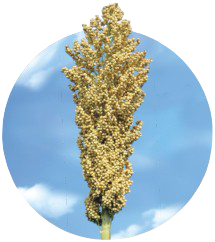|
When compared to
rice and wheat, Sorghum has a higher content of calcium. Besides calcium, it
also packed with iron, protein and fibre.
The latest
revelations in connection with this grain point to cardiac benefits.
This benefit
accrues from the presence of antioxidants in fairly large amounts. These
antioxidants present in Sorghum are polyphenolic compounds.
In addition to
the antioxidants, the presence of sorghum wax, contributes to the cardiac
benefit that this millet provides. The wax in this grain contains policosanols
, which help in lowering cholesterol levels.
The rising
incidence of Celiac disease has also led to new interest in this grain. Newer
hybrid variety of this grain is being used to produce gluten free foods for
such patients.
Good source of energy: Jowar is mainly made of starch, a high-energy food. Since it
takes longer time to break-down starch, jowar is a long-acting source of energy
that keeps you full for a longer time. It is also an excellent source of
essential amino acids that make up protein molecules. According to nutritional
experts, the amino acids present in jowar are readily available and
comparatively easily digestible than wheat grains.
Promotes heart
health: Jowar contains niacin, a vitamin that plays a crucial role in
lowering cholesterol levels, thereby preventing heart disease. It is also a
fairly good source of magnesium and potassium, minerals that play a role in
regulating blood pressure. A phytonutrient called lignin, found abundantly in jowar,
is thought to be associated with a lowered risk of cardiac arrest.
Helps digestion: Jowar is rich in insoluble fibre that helps digestion and stool
formation. Fibre reduces the transit time of feces through the colon and
prevents constipation. It also reduces secretion of bile acids and is linked to
a lowered risk of gallstone formation.
Helps prevent
cancer: Several studies have suggested that jowar has cancer-protecting
properties. A study showed that regular intake of jowar protects pre-menopausal
women from developing breast cancer. Partly, this property has been attributed
to the presence of lignin in the grains.
Possess
anti-diabetic effect: Not only does jowar lower the risk
of development of diabetes in healthy individuals but also increases insulin
sensitivity, making it a suitable cereal option for those who are diabetic
|

